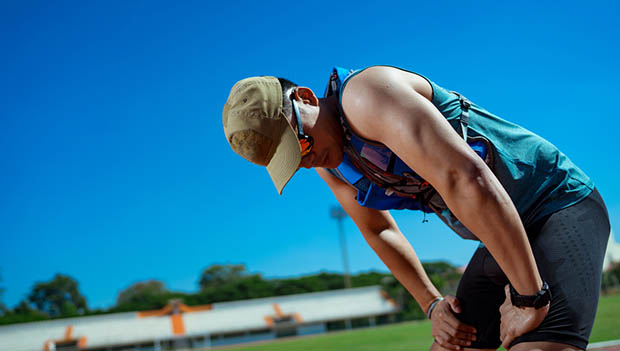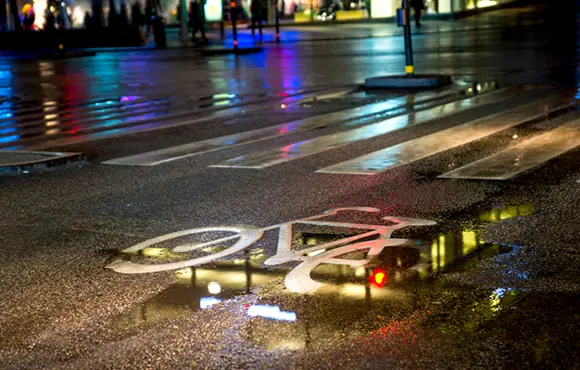
Bonking is properly defined as "a knocking or hitting something," like bumping your head against a low hanging light fixture. It's annoying to bonk your head, but it isn't a catastrophe. In the athletic community, however, we know bonking to have a much more severe outcome. It is when your physical activity comes to an abrupt and painful stop due to extreme fatigue and the inability to continue the activity at the same pace, if at all. Most competitive athletes have experienced this phenomenon at one point or another in their athletic career. Typically, it happens when they're newer to the sport and quickly learn to take measures to avoid it in the future.
Put simply, bonking occurs when an athlete has completely depleted energy stores. During physical exertion, your body uses up glycogen stores for energy and inadequate (if any) exogenous glucose has been consumed to continue making ATP. A body stores roughly 2,000 calories of energy in the form of glucose.
Most athletes burn roughly 100 calories a mile, which is why many marathoners bonk around mile 20. Of course, athletes of all athletic disciplines are susceptible to bonking, but disaster is more likely to strike when the performance is longer than 90 minutes in duration. This puts many triathletes at an increased risk of experiencing a bonk. Unfortunately, once a bonk starts to take pace, it is almost impossible to pull out of it and save the performance. Luckily, why we bonk is pretty understood, and there are simple ways to prevent a failed workout or race because of it.
Keep Your Tank Full
It's true that your body stores energy, but if you are restricting intake, training daily or live a very active lifestyle, you can't expect your stores to always be full. Most athletes at risk of bonking during a performance need to consume roughly five grams of carbohydrate per kilogram of body weight per day. Track your intake for a few days to see if you are consuming enough energy each day to go into sessions with enough fuel in the tank.
Fuel Your Performance
Your body only holds so much energy, and completely depleting that energy shouldn't be the goal of the performance. To ensure your body has enough to run on, you'll need to take in outside energy in the form of carbohydrate. Most activities lasting over 90 minutes require exogenous forms to avoid energy levels dipping dangerously low. Aim to take in gels, sport drinks, bars, dried fruit or other sources of carbohydrate at a rate of 45 to 90 grams an hour. Having a small, easy-to-digest carbohydrate snack prior to training is another way to maximize how much energy the body has to work with.
Go the Distance
Long runs are taxing, and endurance rides take all day; but if you want to prep your body to race these distances efficiently, you need to practice going the distance. This allows your body to become more efficient at the motion associated with your activity and use less energy to do the same motion over time. In addition to going long, triathletes have the added task of training all disciplines appropriately and often. The more you do brick and combination workouts, the more your body can efficiently utilize fuel going from one physical motion to the next. Athletes who avoid endurance and/or combination workouts will make their bodies work harder come race day, which leads to burning through energy at a more rapid pace.
Race Like You Train
Athletes who train at one pace only to reach far beyond that intensity during the race are more at risk of bonking. This happens because your energy is depleted at a faster rate when the intensity increases. Attempting to perform at a rate beyond your trained capacity will require additional sources of carbohydrate. Athletes who go out hard from the gun and ignore the wisdom of an even-paced or negative-split race are more susceptible to falling flat well before the finish line.
You can avoid bonking by taking in adequate carbohydrate before and during physical activity and regulating intensity of the performance. Bonking does not have to be part of your athletic career as it is preventable with a little care and attention to your fueling and training strategies. If you are frequently struggling with bonking during training or competition, contact a sports dietitian to help develop a personalized plan to get you back on track for success.
READ THIS NEXT: Everything You Need to Know About Bonking








Discuss This Article